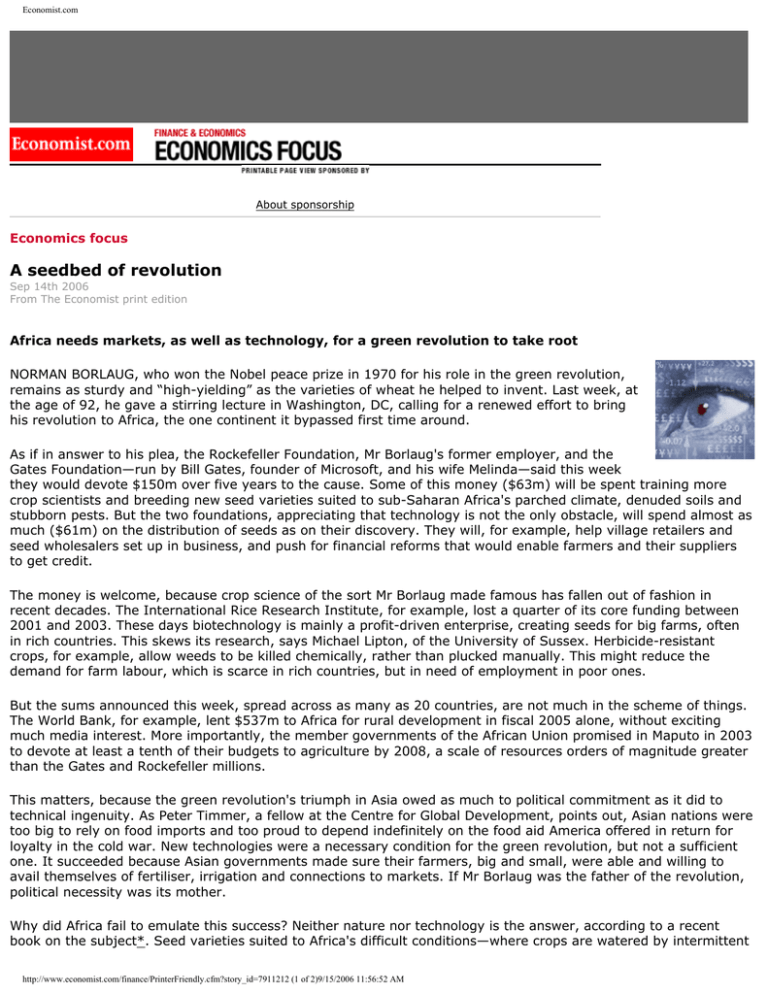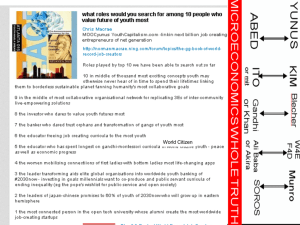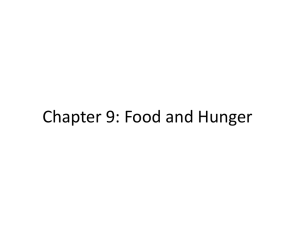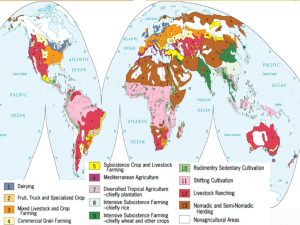A seedbed of revolution
advertisement

Economist.com About sponsorship Economics focus A seedbed of revolution Sep 14th 2006 From The Economist print edition Africa needs markets, as well as technology, for a green revolution to take root NORMAN BORLAUG, who won the Nobel peace prize in 1970 for his role in the green revolution, remains as sturdy and “high-yielding” as the varieties of wheat he helped to invent. Last week, at the age of 92, he gave a stirring lecture in Washington, DC, calling for a renewed effort to bring his revolution to Africa, the one continent it bypassed first time around. As if in answer to his plea, the Rockefeller Foundation, Mr Borlaug's former employer, and the Gates Foundation—run by Bill Gates, founder of Microsoft, and his wife Melinda—said this week they would devote $150m over five years to the cause. Some of this money ($63m) will be spent training more crop scientists and breeding new seed varieties suited to sub-Saharan Africa's parched climate, denuded soils and stubborn pests. But the two foundations, appreciating that technology is not the only obstacle, will spend almost as much ($61m) on the distribution of seeds as on their discovery. They will, for example, help village retailers and seed wholesalers set up in business, and push for financial reforms that would enable farmers and their suppliers to get credit. The money is welcome, because crop science of the sort Mr Borlaug made famous has fallen out of fashion in recent decades. The International Rice Research Institute, for example, lost a quarter of its core funding between 2001 and 2003. These days biotechnology is mainly a profit-driven enterprise, creating seeds for big farms, often in rich countries. This skews its research, says Michael Lipton, of the University of Sussex. Herbicide-resistant crops, for example, allow weeds to be killed chemically, rather than plucked manually. This might reduce the demand for farm labour, which is scarce in rich countries, but in need of employment in poor ones. But the sums announced this week, spread across as many as 20 countries, are not much in the scheme of things. The World Bank, for example, lent $537m to Africa for rural development in fiscal 2005 alone, without exciting much media interest. More importantly, the member governments of the African Union promised in Maputo in 2003 to devote at least a tenth of their budgets to agriculture by 2008, a scale of resources orders of magnitude greater than the Gates and Rockefeller millions. This matters, because the green revolution's triumph in Asia owed as much to political commitment as it did to technical ingenuity. As Peter Timmer, a fellow at the Centre for Global Development, points out, Asian nations were too big to rely on food imports and too proud to depend indefinitely on the food aid America offered in return for loyalty in the cold war. New technologies were a necessary condition for the green revolution, but not a sufficient one. It succeeded because Asian governments made sure their farmers, big and small, were able and willing to avail themselves of fertiliser, irrigation and connections to markets. If Mr Borlaug was the father of the revolution, political necessity was its mother. Why did Africa fail to emulate this success? Neither nature nor technology is the answer, according to a recent book on the subject*. Seed varieties suited to Africa's difficult conditions—where crops are watered by intermittent http://www.economist.com/finance/PrinterFriendly.cfm?story_id=7911212 (1 of 2)9/15/2006 11:56:52 AM Economist.com rains, not by a reliable system of irrigation—were invented. The first synthetic maize was released in Kenya in 1961 and even lowly cassava, a starchy root vegetable, benefited from genetic embellishments in the 1970s. But with some exceptions Africa's governments saw the new seeds and fertiliser as a way to secure political favour, not the food supply. In Nigeria credit and subsidies were hogged by “absentee farmers, retired civil servants and soldiers”. Ethiopia's poor roads left the country's markets so fragmented that in 2001 smallholders in one part of the country were almost ruined by a glut, even as farmers elsewhere were ruined by drought. Farmers in sub-Saharan Africa now use only about 9kg of fertiliser per hectare on average, compared with 142kg in South-East Asia. Their reluctance has been put down to ignorance (farmers do not appreciate the benefits of fertiliser until they have tried it), timidity (they are wary of upfront commitments of money and prefer farming that delivers a reliable, even if low, return) or illiquidity (farmers cannot get the credit they need to afford seeds and fertiliser). Food, glorious food Few countries have ever enjoyed an industrial revolution without first undergoing a revolution in agriculture, a point both Mr Gates and Mr Timmer are keen to stress. Besides, raising yields on smallholder farms would have happy distributional consequences. Food is doubly important to the poor, because growing it accounts for a big share of their employment and buying it accounts for a big share of their expenditure. Raising farm productivity should, in principle, raise the incomes the rural poor earn from the food they sell, even as it reduces the price the urban poor must pay for the food they buy. But cultivating a resilient, bountiful crop may be easier than cultivating an equally thriving market, with access to credit and distribution channels. The foundations understand this task, but no charity, however large, can accomplish it. African governments say they also understand it and have been as good as their word, recently agreeing to drop tariffs on the cross-border sale of fertiliser, a particular boon to landlocked countries. For his part, Mr Borlaug is undeterred. For a nonagenarian, he puts great faith in youthful optimism. He wants to recruit “young people, right out of school” to his banner, reaching them before they have become accustomed to failure. In this business, the revolutionaries, as well as their seeds, must be resistant to the common blight of defeatism and despair. * ‘The African Food Crisis', edited by Göran Djurfeldt et al. CABI Publishing 2005. Copyright © 2006 The Economist Newspaper and The Economist Group. All rights reserved. http://www.economist.com/finance/PrinterFriendly.cfm?story_id=7911212 (2 of 2)9/15/2006 11:56:52 AM





